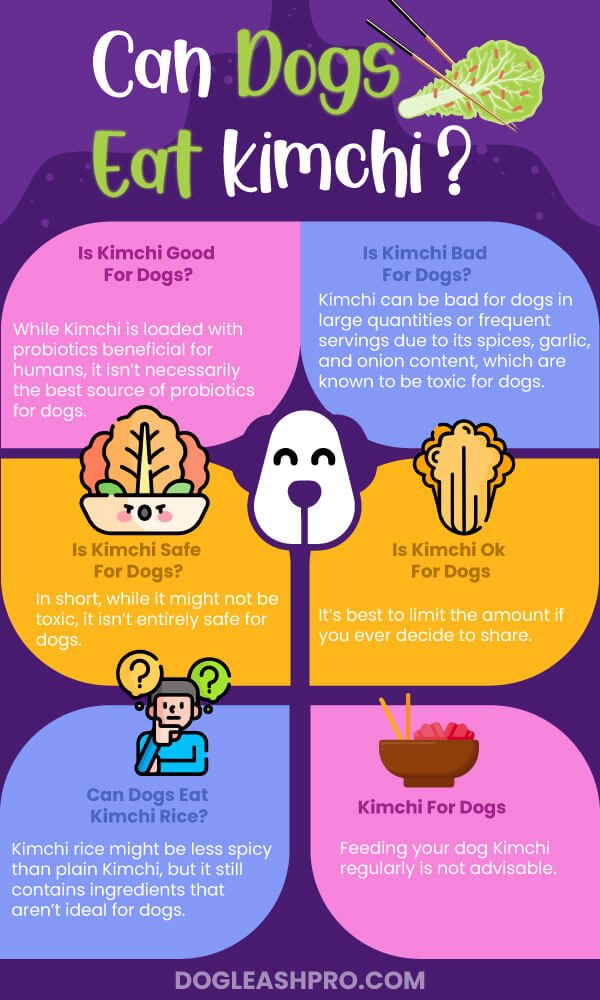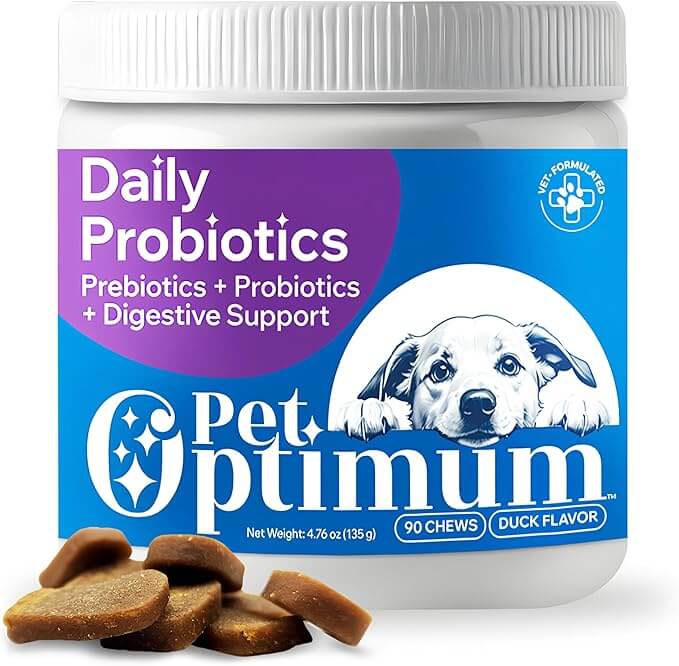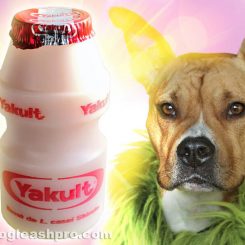
Can Dogs Eat Kimchi? Dogs can occasionally consume small amounts of Kimchi, but it’s not recommended as a regular treat. Kimchi contains spices, garlic, and onions. Consuming this fermented vegetable in large quantities can harm dogs. It’s best to offer dog-specific foods or probiotics for their dietary needs.
We all know our furry friends have curious appetites, often desiring a taste of what we’re eating. One dish they might have taken an interest in could be your serving of Kimchi.
But before you decide to share, let’s dive deep into understanding whether offering this spicy fermented dish to our four-legged companions is safe.
Table of Contents
Can Dogs Have Kimchi?

In small amounts and on rare occasions, most dogs can have Kimchi without any immediate harmful effects.
But remember, Kimchi is spicy and might not agree with your pet’s digestive system.
If you’re looking for probiotics, consider PetOptimum Probiotics for Dogs instead.
PetOptimum Probiotics for Dogs is a highly recommended probiotic supplement that promotes intestinal health and balance, particularly aiding in the dietary management of diarrhea in puppies and adult dogs.
Additionally, it bolsters a strong immune system and provides beneficial antioxidants, all in an easy-to-feed powder form.
READ NEXT: Can Dogs Eat Beets?
What Is Kimchi?
Kimchi is a traditional Korean fermented vegetable dish. Kimchi is made of napa cabbage or radishes seasoned with chili pepper, garlic, ginger, scallions, and salted seafood, then fermented.
Is Kimchi Good For Dogs?
While Kimchi is loaded with probiotics beneficial for humans, it isn’t necessarily the best source of probiotics for dogs. The spices and seasonings used in Kimchi might upset your dog’s stomach.
Is Kimchi Bad For Dogs?
Kimchi can be bad for dogs in large quantities or frequent servings due to its spices, garlic, and onion content, which are known to be toxic for dogs.
Always exercise caution and prioritize your furry friend’s health.
Is Kimchi Safe For Dogs?

In short, while it might not be toxic, it isn’t entirely safe for dogs. It’s better to err on the side of caution and avoid regular servings.
READ ALSO: Can Dogs Eat Horseradish? Is Horseradish Safe for Dogs?
Is Kimchi Ok For Dogs?
It’s best to limit the amount if you ever decide to share. A tiny piece might not harm them but don’t make it a regular treat.
Kimchi For Dogs

Feeding your dog Kimchi regularly is not advisable. Always monitor for any signs of discomfort or allergic reactions if you ever give them a taste.
Can Dogs Eat Kimchi Rice?
Kimchi rice might be less spicy than plain Kimchi, but it still contains ingredients that aren’t ideal for dogs. Opt for plain rice if you want to share it with your furry friend.
RECOMMENDED: Can Dogs Eat Balsamic Vinegar?
My Dog Ate Kimchi! What should I do?
Don’t panic! If your dog ate Kimchi, monitor them closely. Look out for signs of discomfort, excessive thirst, diarrhea, or vomiting. If they display any adverse reactions, consult your vet immediately.
Fermented Foods For Dogs
The topic of fermented food for dogs has been gaining traction lately. Fermented foods can offer probiotics, but choosing those made specifically for dogs is essential.
For dog owners seeking a reliable source of probiotics without the uncertainty of fermented foods, PetOptimum Probiotics for Dogs offers a vet-recommended solution.
This supplement is specifically formulated for canines, ensuring a balanced gut and promoting a robust immune system.
Can Dogs Eat Fermented Foods?
Yes, but it depends on the food. Some fermented foods can benefit dogs, but always ensure they are free from harmful ingredients such as garlic and onions, salt, chili peppers, and alcohol.
Fermented Dog Food
Fermenting dog food is becoming a new trend. Always select a reputable brand and consult your vet when choosing one.
Fermented Raw Dog Food
This combines the benefits of raw feeding with fermentation. However, ensure it’s specifically made for dogs to avoid any health risks.
DON’T MISS: Can My Dogs Drink Sprite?
Fermented Carrots For Dogs
A great treat! Fermented carrots can be good for dogs when done right. Below is a quick recipe.
Fermented Carrots For Dogs Recipe
- Slice organic carrots.
- Place in a jar with water, a pinch of salt, and some canine-safe probiotics.
- Seal and let it ferment for 5 to 7 days.
- Serve in small amounts as a treat!
Fermented Vegetables For Dogs
Veggies like cucumbers and carrots are excellent options. Just make sure to ferment them in a dog-friendly way, avoiding any harmful ingredients.
DID YOU KNOW: Did you know that ginger can be fermented, resulting in a tangy and probiotic-rich preparation often used in natural sodas and ginger beer?
Is Kombucha Good For Dogs?
While humans love kombucha, it’s not ideal for dogs. The caffeine and alcohol content can be harmful to our canine friends.
Instead of feeding your dogs Kombucha, consider PetOptimum Probiotics for Dogs for beneficial probiotics.
So, Can Dogs Eat Kimchi?
While the allure of sharing our favorite foods with our furry companions is strong, it’s vital to prioritize their health and dietary needs.
With its spices and ingredients potentially harmful to dogs, Kimchi is best enjoyed by humans alone. Instead, opt for dog-safe treats and probiotics tailored to their digestive health.
Remember, always keep your dog’s best interest at heart!
DISCLAIMER: THIS WEBSITE DOES NOT PROVIDE MEDICAL ADVICE
The information, including but not limited to, text, graphics, images and other material contained on this website are for informational purposes only. No material on this site is intended to be a substitute for professional veterinary advice, diagnosis, or treatment. Always seek the advice of your veterinarian or other qualified health care provider with any questions you may have regarding dietary needs.
Resources:
https://www.ncbi.nlm.nih.gov/pmc/articles/PMC5039233/
https://en.wikipedia.org/wiki/Kimchi

With over five years of specialized experience as an animal writer, my expertise lies in dog nutrition, health, behavior, grooming, and training. I am dedicated to delivering helpful and informative content that caters to the well-being of our furry friends. My primary goal is to empower pet owners with knowledge and ensure our canine companions thrive in health and happiness. In my free time, I love volunteering at local dog rescue centers.









